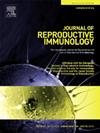Does COVID-19 infection or COVID-19 mRNA vaccination induce antiphospholipid antibodies in women with recurrent pregnancy loss?
IF 2.9
3区 医学
Q3 IMMUNOLOGY
引用次数: 0
Abstract
Antiphospholipid syndrome (APS) is a well-established cause of recurrent pregnancy loss (RPL). If coronavirus disease 2019 (COVID-19) infection or vaccination induces antiphospholipid antibody (aPL) production, it may lead to miscarriage in subsequent pregnancies. We investigated the association between COVID-19 infection and vaccination history with aPL positivity in women with RPL. This study included 424 women with RPL. We found no difference in the positivity rate for aPL according to the presence or absence of a history of COVID-19 infection. The positivity rate was significantly higher in patients infected during the omicron period (27.9 %, 43/154) than in those infected during the delta period (8.7 %, 2/23) of the COVID-19 pandemic (P = 0.0351). Of the 416 patients with a detailed vaccination history, 365 (87.7 %) had received at least one vaccination. The aPL positivity rate did not significantly differ according to the history of vaccination or number of vaccinations. Our results suggest that mild COVID-19 infection and vaccination are unlikely to stimulate aPL production and, therefore, are unlikely to increase miscarriage due to APS.
求助全文
约1分钟内获得全文
求助全文
来源期刊
CiteScore
6.30
自引率
5.90%
发文量
162
审稿时长
10.6 weeks
期刊介绍:
Affiliated with the European Society of Reproductive Immunology and with the International Society for Immunology of Reproduction
The aim of the Journal of Reproductive Immunology is to provide the critical forum for the dissemination of results from high quality research in all aspects of experimental, animal and clinical reproductive immunobiology.
This encompasses normal and pathological processes of:
* Male and Female Reproductive Tracts
* Gametogenesis and Embryogenesis
* Implantation and Placental Development
* Gestation and Parturition
* Mammary Gland and Lactation.

 求助内容:
求助内容: 应助结果提醒方式:
应助结果提醒方式:


